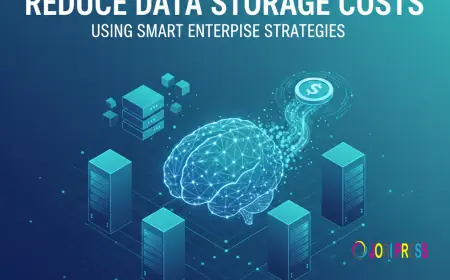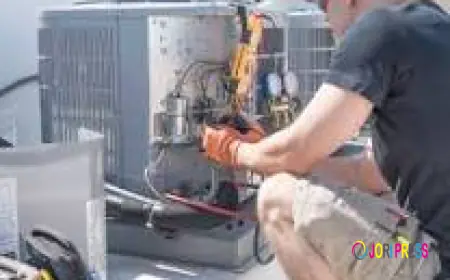Smart Contract Development Heats Up: Why Enterprises Are Choosing Web3 in 2025
In 2025, enterprises are rapidly adopting Web3 technologies, with smart contract development at the core of this shift. This article explores why businesses are turning to smart contract development companies and services to enhance automation, security, and transparency, and how these technologies are transforming industries across finance, healthcare, and supply chain.

Introduction: The Web3 Revolution
As blockchain technology matures and decentralization gains mainstream traction, enterprises are beginning to recognize the immense potential of Web3. Web3 represents the next iteration of the internet, emphasizing user ownership, decentralization, and trustless systems. At the heart of this evolution lies smart contract development. Unlike traditional contracts, smart contracts are self-executing lines of code that automatically enforce and verify the terms of an agreement on a blockchain network. In 2025, smart contract development services have become crucial for enterprises aiming to streamline operations, enhance security, and engage in decentralized ecosystems.
The Growing Demand for Smart Contract Development
The enterprise world has evolved rapidly in the past few years. Organizations across sectors such as finance, supply chain, insurance, healthcare, and gaming are exploring blockchain solutions. Smart contract development companies are at the center of this transition, offering customized solutions that enable secure, automated, and transparent operations.
Financial institutions are deploying smart contracts for automated clearing and settlement, eliminating intermediaries and reducing processing time. In logistics, smart contracts ensure that every step in the supply chain is recorded immutably, enabling greater traceability and efficiency. Healthcare organizations use smart contracts to manage patient consent, data privacy, and inter-hospital interoperability. This enterprise adoption is driving unprecedented demand for expert smart contract development services.
Why Enterprises Prefer Web3 Over Web2
Web2 was largely defined by centralized platforms, data monopolies, and cloud-based infrastructure. In contrast, Web3 offers decentralized networks where users retain control over data and digital assets. For enterprises, this shift brings several advantages.
First is the enhanced transparency of Web3. All actions taken on a blockchain can be verified by any network participant, reducing the risk of fraud or manipulation. Second is the immutability of data, ensuring that records cannot be tampered with once recorded. This is especially crucial for sectors dealing with sensitive data or legal compliance. Third, decentralization reduces reliance on centralized cloud providers, mitigating single points of failure and censorship risks.
Smart contract development services leverage these advantages by building applications that align with enterprise needs, from decentralized identity solutions to tokenized asset management systems. As Web3 infrastructure matures, the reliability and scalability of blockchain networks make them increasingly attractive for enterprise-grade deployment.
The Role of Smart Contract Development Companies
Smart contract development companies act as enablers of Web3 transformation. They help businesses translate operational logic into secure, decentralized code. This involves consulting on blockchain strategy, choosing the right platform (such as Ethereum, Solana, or Avalanche), writing and testing smart contracts, and integrating them into existing systems.
In 2025, these companies offer services beyond just development. They provide formal verification, smart contract auditing, post-deployment support, and even tokenomics design for enterprises launching decentralized ecosystems. They are also instrumental in educating internal teams, helping companies build in-house capabilities to manage their Web3 infrastructure.
Security is a core focus of any reputable smart contract development company. Past failures such as The DAO hack or the Parity wallet bug underline the need for meticulous development and rigorous testing. Developers must understand attack vectors, coding standards, and evolving threat models. This has led to an increase in demand for specialists proficient in Solidity, Vyper, Move, and other Web3 programming languages.
Custom Smart Contract Use Cases in Enterprise
The use cases for smart contracts are expanding as more enterprises experiment with blockchain technology. In real estate, smart contracts automate escrow agreements and transfer of ownership. In the insurance sector, claim processing is increasingly being handled by smart contracts that automatically release payments upon the occurrence of predefined conditions.
Enterprises in digital media are leveraging smart contracts for transparent royalty distribution. Whenever a digital asset is sold or licensed, the contract ensures instant and fair distribution of earnings among rights holders. Government agencies are using blockchain for public record management, voting systems, and welfare disbursement.
One particularly promising application is decentralized identity. Enterprises are using smart contracts to create verifiable credentials that users control directly. This innovation is streamlining KYC/AML processes, enhancing security, and empowering individuals with ownership of their data.
Integration with Legacy Systems
For enterprises, integrating smart contracts with existing systems is both a technical and organizational challenge. Legacy software, centralized databases, and traditional cloud infrastructures must interact with decentralized protocols without disrupting operations.
Smart contract development companies play a pivotal role in facilitating this transition. They build APIs, data bridges, and middleware layers that enable secure and scalable interactions between on-chain and off-chain systems. Enterprise-grade blockchains such as Hyperledger Fabric and Quorum are often used for permissioned environments where compliance and data privacy are key concerns.
In 2025, integration strategies are becoming more sophisticated. Enterprises are adopting hybrid solutions, where sensitive data remains off-chain, while smart contracts handle verification and logic execution. This approach preserves confidentiality while benefiting from blockchain's trustless features.
Compliance and Regulation
As smart contract adoption grows, so does regulatory scrutiny. Enterprises must navigate a complex landscape of local and international laws concerning data privacy, consumer protection, and financial compliance.
Smart contract development services must ensure that deployed solutions are not only technically sound but also legally defensible. Legal engineers and compliance experts often work alongside developers to embed regulatory logic into the code itself. Features such as transaction limits, KYC enforcement, and jurisdictional controls are integrated at the smart contract level.
In 2025, proactive regulation is helping to legitimize smart contracts as legally binding instruments. Governments are introducing digital asset frameworks, and courts are beginning to recognize code-based agreements in disputes. This regulatory clarity is encouraging more enterprises to move forward with Web3 initiatives.
The Evolving Technology Stack
The technology stack for smart contract development is continuously evolving. Frameworks like Hardhat, Foundry, and Truffle are standard tools for Ethereum development. Cross-chain platforms such as Polkadot and Cosmos are enabling interoperability. Rollups and Layer 2 solutions are making transactions faster and cheaper, which is critical for enterprise scalability.
Decentralized storage solutions like IPFS, Filecoin, and Arweave are being used alongside smart contracts to manage large datasets. Identity frameworks like Soulbound tokens and decentralized identifiers (DIDs) are providing a new layer of security and personalization.
The convergence of AI with smart contracts is another major trend in 2025. Predictive models, sentiment analysis, and automated decision-making are being embedded into decentralized applications. This is creating new opportunities for intelligent automation and autonomous organizations.
Choosing the Right Smart Contract Development Partner
Given the complexity of smart contract development, enterprises must choose their technology partners carefully. A strong smart contract development company should have a proven track record, transparent development processes, and a multidisciplinary team. Experience with multiple blockchain ecosystems, security auditing, and regulatory compliance is essential.
Companies should also consider ongoing support and upgradeability. Since smart contracts are immutable by default, upgrade patterns such as proxy contracts or modular architecture must be planned from the beginning. Continuous monitoring and incident response mechanisms are crucial for maintaining operational integrity post-deployment.
Client collaboration is another key factor. The best smart contract development services work closely with enterprise stakeholders, translating business goals into functional specifications and providing education to internal teams throughout the process.
Conclusion: A Decentralized Future Beckons
The rise of Web3 is not a passing trend—it is a structural shift in how digital systems are built, managed, and experienced. Smart contracts are at the core of this transformation, enabling new forms of trust, automation, and collaboration. For enterprises, adopting smart contract technology in 2025 is no longer a matter of "if" but "when" and "how."
Smart contract development company are playing a vital role in guiding businesses through this transition. By offering comprehensive smart contract development services that address both technical and regulatory challenges, they are helping enterprises harness the full potential of Web3.
As the ecosystem matures, smart contracts will become as integral to enterprise infrastructure as cloud computing and APIs once did. Forward-thinking organizations are already building this future. The question now is: will you be part of it?
What's Your Reaction?
 Like
0
Like
0
 Dislike
0
Dislike
0
 Love
0
Love
0
 Funny
0
Funny
0
 Angry
0
Angry
0
 Sad
0
Sad
0
 Wow
0
Wow
0
















































